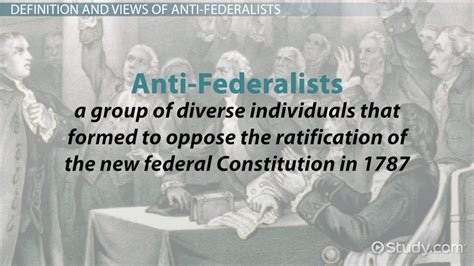Introduction
The Anti-Federalists were a political faction in the United States that opposed the ratification of the Constitution in the late 18th century. They argued that the Constitution gave too much power to the federal government and infringed on the rights of states and individuals. The Anti-Federalist movement played a significant role in the ratification process of the Constitution and shaped the political landscape of the United States.

Origins of the Anti-Federalist Movement
The origins of the Anti-Federalist movement can be traced back to the Articles of Confederation, which was the first constitution of the United States. Under the Articles of Confederation, the federal government had very limited powers, and states retained most of the authority. Many Anti-Federalists believed that the Constitution would create a central government that would be too powerful and overbearing.
Key Figures
- Patrick Henry – Governor of Virginia and a vocal opponent of the Constitution
- George Mason – Delegate to the Constitutional Convention and a leading Anti-Federalist
- Richard Henry Lee – Delegate to the Continental Congress and a prominent Anti-Federalist
Principles of the Anti-Federalist Movement
The Anti-Federalists put forward several arguments against the ratification of the Constitution. These principles include:
- Limited Government: Anti-Federalists believed that the federal government should have only limited powers and that the Constitution granted too much authority to the federal government. They argued that this would lead to a tyranny of the majority and a loss of individual liberties.
- States’ Rights: Anti-Federalists argued that the Constitution would infringe on the rights of states and that the federal government would become too dominant. They believed that states should retain their sovereignty and independence.
- Individual Rights: Anti-Federalists were concerned that the Constitution did not adequately protect individual rights. They argued that the federal government could infringe on the rights of citizens without due process of law.
Structure of the Anti-Federalist Movement
The Anti-Federalist movement was a grassroots phenomenon, with support from various groups across the United States. Anti-Federalists organized themselves into local and state committees, and they published numerous pamphlets and essays arguing against the ratification of the Constitution.
Distribution of Support
The Anti-Federalists had varying levels of support in different states:
| State | Anti-Federalist Sentiment |
|---|---|
| Massachusetts | Strong |
| New York | Moderate |
| Virginia | Strong |
| Pennsylvania | Moderate |
Arguments Against the Constitution
The Anti-Federalists published numerous essays and pamphlets outlining their arguments against the Constitution. Some of their key arguments include:
- The Constitution creates a powerful central government that will encroach on the rights of states and individuals.
- The Constitution does not adequately protect individual rights, such as freedom of speech and religion.
- The Constitution will lead to a tyranny of the majority, where the rights of minorities will be ignored.
The Ratification Process
The ratification process of the Constitution was a heated and contentious affair. The Constitution required ratification by at least nine states, and the Anti-Federalists made every effort to block ratification. Despite their efforts, the Constitution was eventually ratified by all 13 states, with the final state (Rhode Island) ratifying in 1790.
Anti-Federalist Impact
The Anti-Federalists played a significant role in the ratification process of the Constitution. Their arguments and influence led to the addition of the Bill of Rights to the Constitution, which protected individual rights and limited the powers of the federal government.
Conclusion
The Anti-Federalist movement was a significant force in the founding of the United States. Their principles of limited government, states’ rights, and individual rights have had a lasting impact on the American political system. The Bill of Rights, which was added to the Constitution in response to Anti-Federalist concerns, remains a cornerstone of American democracy and individual liberty.
